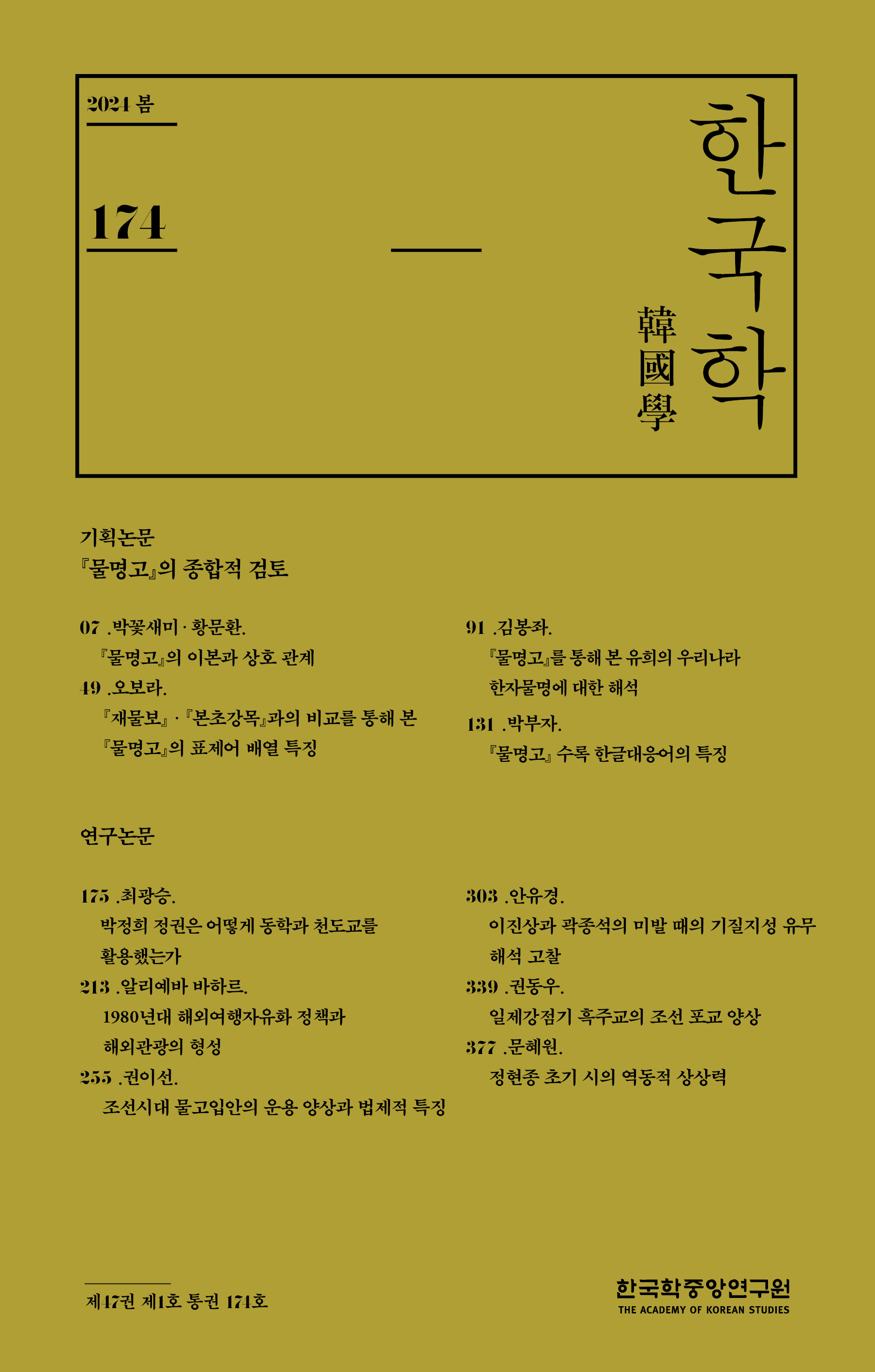
- P-ISSN 2671-8197
- E-ISSN 2733-936X
.jpg)
This study regards the army special volunteer system, which is often dubbed an ‘embarrassing dilemma and mystery’ in modern Korean history, as a valid prism through which political dependent relations and interactions between the colonial government and colonized society can be investigated. It analyzes the recruitment procedure of the system, covering application, screening, admission and enlistment from 1938 to 1943, and estimates the number of applicants, qualified persons, admittees and enlistees by region and year. Then, it attempts an in‒depth examination of the applicants’ motivations and inner thoughts, using cross‒sectional data from 1941. For research methodology, it employs a reconstructive perspective in which coercion in structure and reality is discerned, and the analysis unit is individuals who are, in nature, sensible and selfish at the same time. Relying on information available from Japan’s Legislation Bureau (1943) and the 1941 Session of the Imperial Parliament, the study empirically investigates the structure and characteristics of the army special volunteer system.
오성철, 『식민지 초등 교육의 형성』. 교육과학사, 2000.
고시다 유타카(吉田裕) 저, 최혜주 역, 『일본의 군대: 병사의 눈으로 본 근대일본』. 논형, 2005.
이영재, 『제국 일본의 조선영화』. 현실문화, 2008.
최유리, 『일제 말기 식민지 지배정책 연구』. 국학자료원, 1997.
한기언 편, 『일제의 문화침탈사』. 민중서관, 1970.
ブランドン・パーマー, 塩谷紘, 『日本統, 治下朝鮮の戦時動員』. 草思社, 2014.
マ‒ク·ピ‒ティ‒, 浅野豊美訳, 『植民地: 帝国50年の興亡』. 読売新聞社, 1996.
宮田節子, 『朝鮮民衆と「皇民化」政策』. 未来社, 1985.
內海愛子, 『朝鮮人<皇軍>兵士たちの戰爭』. 岩波書店, 1992.
朴慶植, 『日本帝國主義の朝鮮支配』. 靑木書店, 1973.
裴淵弘, 『朝鮮人特攻隊: 「日本人」として死んだ英靈たち』. 新潮社, 2009.
北原道子, 『北方部隊の朝鮮人兵士』. 現代企画室, 2014.
山口隆, 『他者の特攻ー朝鮮人特攻兵の記憶·言説·実像』. 社会評論社, 2010.
山之內靖, ヴィクタ‒ コシュマン, 成田龍一編, 『總力戰と現代化』. 柏書房, 2000.
森村敏己, 『視覚表像と集合的記憶』. 旬報社, 2006.
樋口雄一, 『戦時下朝鮮の民衆と徴兵』. 総和社, 2001.
樋口雄一, 『皇軍兵士にされた朝鮮人』. 社会評論社, 2001.
洪宗郁, 『戰時期朝鮮の轉向者たち』. 有志舍, 2011.
김낙년, 「식민지기 조선의 소득불평등, 1933‒1940」. 『경제사학』 제55호, 2013, 249‒279쪽.
김민철, 「조선총독부의 농촌 중견인물 정책 연구」. 『한국민족운동사』 제41집, 2004, 187‒232쪽.
김상규, 「전시체제기(1937‒1945) 조선주둔일본군의 陸軍 兵事部 설치와 역할」. 『한국근현대사연구』 제67집, 2013, 417‒450쪽.
이덕기, 「제국의 호명, 빗나간 응답」. 『한국극예술연구』 제31집, 2010, 239‒270쪽.
이영훈, 「20세기 전반 彦陽의 小農社會」. 『경제논집』 제54권 제1호, 2015, 75‒182쪽.
장용경, 「‘조선인’과 ‘국민’의 간극」. 『역사문제연구』 제15호, 2005, 279‒300쪽.
정명중, 「파시즘과 감성동원」. 『호남문화연구』 제45호, 2009, 337‒380쪽.
정안기, 「1930년대 조선형 특수회사 <경춘철도(주)>의 연구」. 『서울학연구』 제64호, 2016, 155‒213쪽.
정안기, 「조선총독부 육군병지원자훈련소와 국민 만들기」. 『한일군사문화연구』 제24집, 2017, 255‒302쪽.
정안기, 「이인석상등병의 전사와 ‘죽음의 정치성’」. 『일본문화학보』 제76집, 2018, 159‒189쪽.
조성운, 「일제하 청년훈련소의 설치와 운영」. 『수원학연구』 제2호, 2005, 215‒238쪽.
표영수, 「일제강점기 육군특별지원병제도와 조선인 강제동원」. 『민족운동사학』 제79호, 2014, 95‒138쪽.
古川宣子, 「植民地期朝鮮における初等敎育」. 『日本史研究』, 第370号, 1993, 331‒516쪽.
宮田節子, 「皇民化政策の構造」. 『朝鮮史研究会論文集』 第29号, 1991, 41‒59쪽.